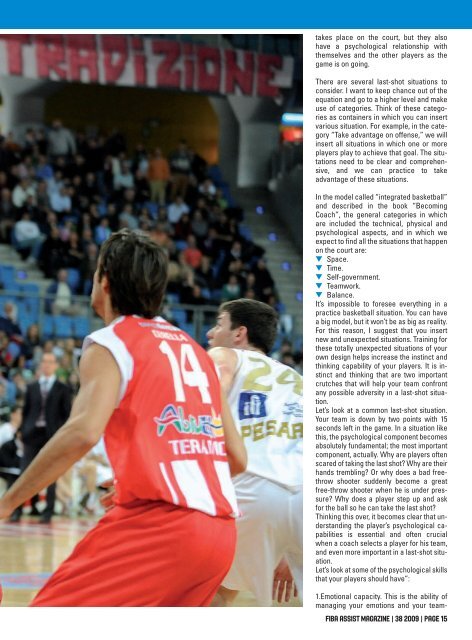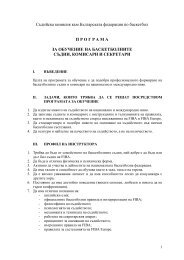than a watch - FIBA.com
than a watch - FIBA.com
than a watch - FIBA.com
You also want an ePaper? Increase the reach of your titles
YUMPU automatically turns print PDFs into web optimized ePapers that Google loves.
takes place on the court, but they also<br />
have a psychological relationship with<br />
themselves and the other players as the<br />
game is on going.<br />
There are several last-shot situations to<br />
consider. I want to keep chance out of the<br />
equation and go to a higher level and make<br />
use of categories. Think of these categories<br />
as containers in which you can insert<br />
various situation. For example, in the category<br />
“Take advantage on offense,” we will<br />
insert all situations in which one or more<br />
players play to achieve that goal. The situtations<br />
need to be clear and <strong>com</strong>prehensive,<br />
and we can practice to take<br />
advantage of these situations.<br />
In the model called “integrated basketball”<br />
and described in the book “Be<strong>com</strong>ing<br />
Coach”, the general categories in which<br />
are included the technical, physical and<br />
psychological aspects, and in which we<br />
expect to find all the situations that happen<br />
on the court are:<br />
▼ Space.<br />
▼ Time.<br />
▼ Self-government.<br />
▼ Teamwork.<br />
▼ Balance.<br />
It’s impossible to foresee everything in a<br />
practice basketball situation. You can have<br />
a big model, but it won’t be as big as reality.<br />
For this reason, I suggest that you insert<br />
new and unexpected situations. Training for<br />
these totally unexpected situations of your<br />
own design helps increase the instinct and<br />
thinking capability of your players. It is instinct<br />
and thinking that are two important<br />
crutches that will help your team confront<br />
any possible adversity in a last-shot situation.<br />
Let’s look at a <strong>com</strong>mon last-shot situation.<br />
Your team is down by two points with 15<br />
seconds left in the game. In a situation like<br />
this, the psychological <strong>com</strong>ponent be<strong>com</strong>es<br />
absolutely fundamental; the most important<br />
<strong>com</strong>ponent, actually. Why are players often<br />
scared of taking the last shot? Why are their<br />
hands trembling? Or why does a bad freethrow<br />
shooter suddenly be<strong>com</strong>e a great<br />
free-throw shooter when he is under pressure?<br />
Why does a player step up and ask<br />
for the ball so he can take the last shot?<br />
Thinking this over, it be<strong>com</strong>es clear that understanding<br />
the player’s psychological capabilities<br />
is essential and often crucial<br />
when a coach selects a player for his team,<br />
and even more important in a last-shot situation.<br />
Let’s look at some of the psychological skills<br />
that your players should have”:<br />
1.Emotional capacity. This is the ability of<br />
managing your emotions and your team-<br />
Fiba Assist Magazine | 38 2009 | Page 15




